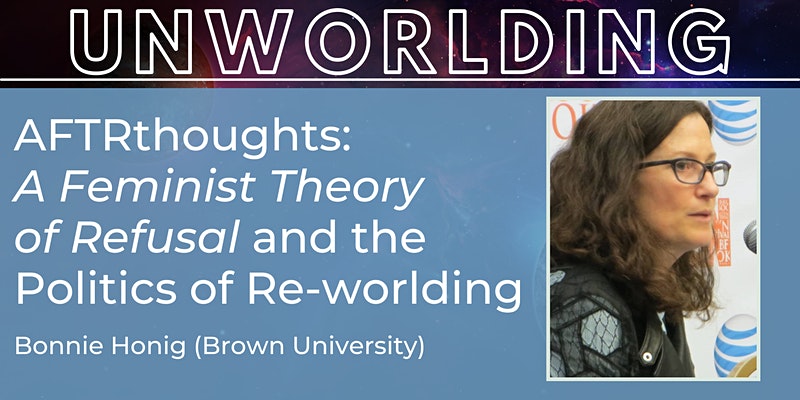Events

- This event has passed.
Unworlding: Bonnie Honig
April 25, 2022 @ 4:00 pm
Free

This talk will rehearse the idea of an arc of refusal, theorized in A Feminist Theory of Refusal (AFTR, Harvard 2021) alongside a reading of Euripides’ great drama of refusal, the Bacchae. The arc of refusal in the Bacchae brings those who abandoned the city back to it. Outside the city, the bacchants celebrate Dionysus (god of wine and theater), and rehearse an alternative form of life, one without work or (re)production. Spied upon by the King, they kill him and celebrate their prowess. When the bacchants return to the city, they seek to transform it, but the city does not receive them on their terms. Their Dionysian escape becomes a mere festival — an exception.
Must refusal return to the city? The question is explored in and beyond the book that occasions this talk, (re)tracing the arc of refusal in several key sources, including The Fits, a 2016 film about young Black girlhood, John Rawls’ A Theory of Justice, whose famed “grass-counter” is a heretofore unnoticed queer figure of refusal, and The Story of Ferdinand, the children’s book whose protagonist is a gender non-binary bull. Ferdinand returns us to Dionysus,the gender-fluid god who sometimes appears as a bull. We conclude with How To Do Things With Words, a key text in the phiosophy of language but also at the intersection of political and queer theory, in which J.L. Austin exmaines the meaning of the sentence “There is a bull in the field.” What bull is this? It might be Dionysus, since Austin, just 20 pages earlier, cites Euripides’ Hippolytus as a source… inaugurating an uneasy reliance on theatricality that persists throughout his analysis of speech acts as acts of re-worlding.
Event attendees must show proof of vaccination (or a Green Pass through the ReopenCU app) to access event venue
Speaker Bios
Bonnie Honig is Nancy Duke Lewis Professor of Modern Culture and Media (MCM) and Political Science at Brown University, and (by courtesy) Religious Studies (RS) and Theater and Performance Studies (TAPS). She is author of several books, including: Political Theory and the Displacement of Politics (Cornell, 1993, Scripps Prize for best first book), Democracy and the Foreigner (Princeton, 2001), Emergency Politics: Paradox, Law, Democracy (Princeton, 2009, David Easton Prize), Antigone, Interrupted (Cambridge University Press, 2013), Public Things: Democracy in Disrepair (Fordham, 2017), A Feminist Theory of Refusal (Harvard, 2021) and Shell Shocked: Feminist Criticism After Trump (Fordham, 2021: a collection of revised versions of her public writing since 2016).
Honig has also edited or co-edited several collections, including Feminist Interpretations of Hannah Arendt (Penn State, 1995), the Oxford Handbook of Political Theory (Oxford, 2008), and Politics, Theory, and Film: Critical Encounters with Lars von Trier (Oxford, 2016). Her articles have appeared in a wide variety of journals, including Arethusa (Okin-Young Prize for best article in feminist theory), New Literary History, Political Theory, theory&event, Social Text, differences, American Political Science Review, Political Theology, and (fc, 2023) Cultural Critique.
Honig has been interviewed by The Nation and Polity in print and by several podcats, including the Cogut Institute’s Meeting Street and Why We Argue.
In 2017-18 she served as the Inaugural Cranor Phi Beta Kappa Scholar, and she is currently an affiliate of the Digital Democracy Group at Simon Fraser University and the American Bar Foundation in Chicago.
Co-presented with: Columbia University Arts & Sciences Committee on Equity and Diversity; Division of the Humanities; Office of the Vice Provost for Faculty Advancement; Institute for Religion, Culture and Public Life; and The Society of Fellows and Heyman Center for the Humanities
